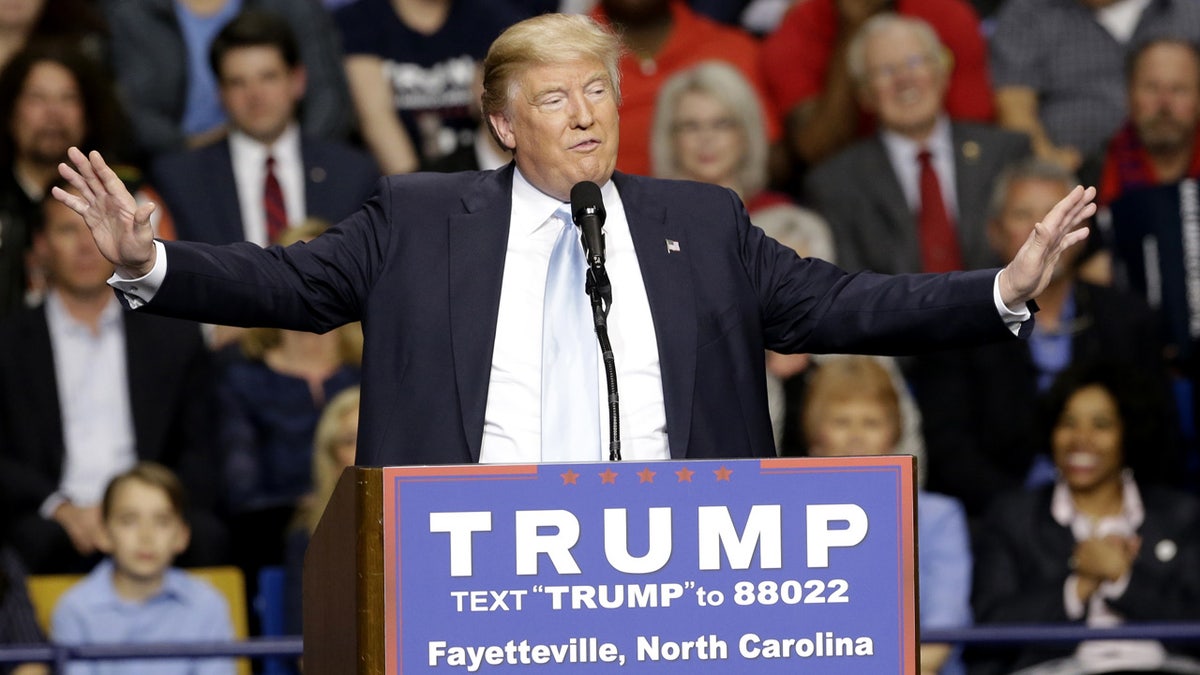
March 9, 2016: Republican presidential candidate Donald Trump speaks during a campaign rally in Fayetteville, N.C. (AP Photo/Gerry Broome)
In an election cycle full of surprises, one of the most striking developments is the number of conservative evangelical Republicans who have stated that they will not vote for the current Republican front-runner: Donald Trump. These include religious figures such as Russell Moore, politicians such as Congressman Ben Sasse, and pundits such as Erick Erickson.
Trump’s victories in the March 8 primaries served only to further solidify his status as front-runner. This status is especially significant in light of a new WSJ/NBC poll showing that a majority of registered voters view both Trump and Clinton negatively. What is true for registered voters as a whole is especially true for many conservative evangelical Republicans.
But the rejection of a Republican nominee would seem to catch evangelicals on the horns of a dilemma: if we do not vote for Trump, we must either vote for a Democratic candidate (who would assuredly be pro-abortion and most likely be weak on religious liberty) or for a hypothetical third-party or write-in candidate (who would be closer to our own views, but less likely to win the general election).
Should evangelicals even consider supporting a candidate who is not a major-party nominee? We should.
Under the United States’ two-party system, people who want their views represented are usually better off promoting them within the big tents of the Republican or Democratic parties. Past examples of this strategy include Howard Dean and various Tea Party and Libertarian candidates. Recent examples include Trump and Sanders.
By staying within one of the two big tents, one can build a following and possibly even forge change within the party. Yet, sometimes the benefits are outweighed by the costs.
The Republican party front runner is one whose campaign is characterized by overheated ethno-nationalistic aggression, who admires authoritarians like Vladimir Putin, who wants to curb free speech, who did not immediately and decisively distance himself from David Duke’s support for his candidacy, who seems only questionably committed to the pro-life and religious liberty causes, and who is not a “pro-growth” candidate economically.
What is the biggest negative to voting for an independent or third-party candidate? Historical perspective reminds us that third-party candidacies are long-shots to win the presidency and may actually take the outcome in a direction we didn’t desire or intend.
However, many evangelical voters seem to be saying that the two big-party front-runners are equally unacceptable. If they become the nominees, the “lesser of two evils” argument doesn’t really apply.
Then why vote for a third-party candidate or write a name in on the ballot? Some evangelicals will do so because they feel conscience-bound. Under this reasoning, an evangelical voter might say that there is something about each of the major-party candidates that is an absolute “deal-killer” for them. In their heart of hearts, they cannot cast a vote in favor.
Other evangelicals will do so as an act of short-term protest, in the hopes of catalyzing long-term change. Although our objections may not rise to the level of being “conscience bound,” our concern is strong enough that we are willing to cast our votes for a long-shot candidate. From one angle we lose our voice by dissociating from a major party. But from another angle we gain our voice by speaking clearly about our long-term vision for American society.
Third-party candidacies or not, the 2016 election cycle offers evangelicals something infinitely more significant than an attractive presidential candidate: it reminds us that we should be very wary of forming unhealthy and uncritical long-term alliances with political parties and platforms. And it gives us the opportunity to find our voice again, rather than having it controlled by the power-brokers of a single political party.
It is yet to be seen if Donald Trump will be the GOP nominee. If he is, conservative evangelical Republicans will be faced with an interesting choice, and we should give ourselves permission to consider supporting a third-party or independent candidacy. But we should also remind ourselves that the choices we make shouldn’t grow from the soil of anxiety, fear, or anger. Our future doesn’t depend on an elected president; it depends on a coming King.
